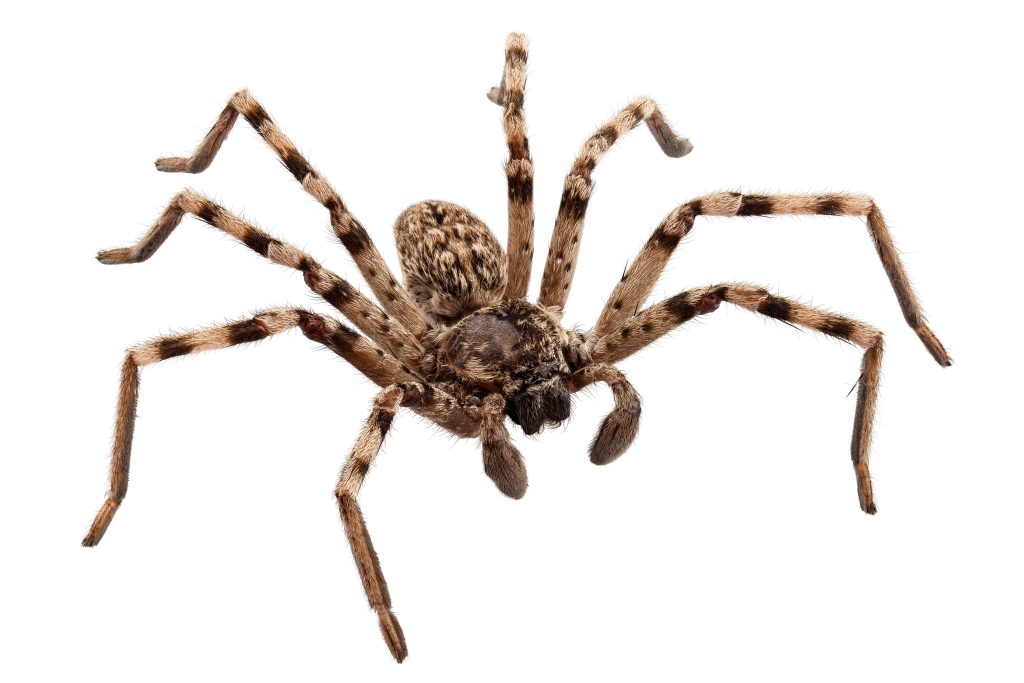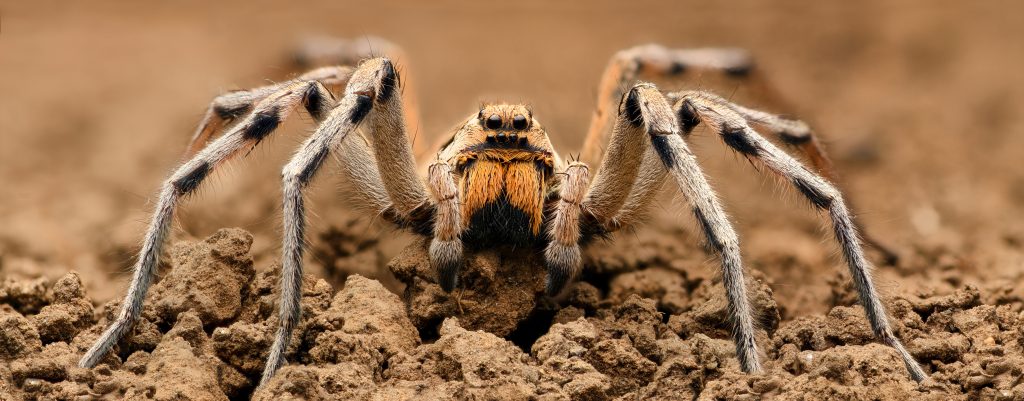Spotting a large, fast-moving spider in your home can stop you in your tracks. For local homeowners, one of the most common—and intimidating—spider encounters involves the wolf spider. With their robust bodies, impressive size, and quick movements, wolf spiders are often mistaken for far more dangerous species. But are wolf spiders truly dangerous, or do they simply look the part?
This in-depth guide will help local residents separate fact from fear. We’ll cover how to identify wolf spiders, explain their behavior, discuss the potential risks to people and pets, and share the most effective ways to keep them under control around your home.
Are Wolf Spiders Dangerous? A Guide for Las Vegas and Henderson, NV Homeowners
The good news for local homeowners is that wolf spiders are not considered dangerous. Unlike black widows or brown recluse spiders, wolf spiders are not medically significant in Nevada. Their venom is not potent enough to cause serious harm in humans, and they are not aggressive by nature.
That said, wolf spiders can still bite if provoked, handled, or trapped against the skin. These bites may cause mild symptoms such as redness, swelling, or localized pain, similar to a bee sting. While most healthy adults experience only temporary discomfort, children, elderly individuals, or those with allergies may have stronger reactions. Still, serious medical complications are extremely rare.
So while wolf spiders may be alarming to encounter, their presence is more a nuisance than a true danger.
How to Identify a Wolf Spider in Your Home or Yard
Wolf spiders are easy to mistake for other large spider species, especially in dimly lit corners or when they dart across the floor. Here are key traits to help Henderson residents recognize them:
- Size: Adults range from ½ inch to 1 ½ inches in body length, not including their legs. Some of the larger species in Nevada can appear even bigger.
- Coloring: Typically brown, gray, or black with light and dark striping or mottled patterns on their backs.
- Eyes: Wolf spiders have eight eyes arranged in three rows, with two large, forward-facing eyes that reflect light. If you shine a flashlight in a dark yard, their eyes may appear to “glow.”
- Body Shape: Stocky and hairy, unlike the slender-bodied orb weavers or the shiny black widow.
- Behavior: They don’t spin webs to catch prey. Instead, they hunt actively on the ground, often darting across open spaces.
In Henderson, you’re most likely to spot them in gardens, under rocks, around garages, or occasionally wandering indoors in search of prey.
Wolf Spider Behavior and Potential Risks to People and Pets
Wolf spiders are solitary, nocturnal hunters. Instead of waiting in webs, they actively chase down insects like crickets, beetles, ants, and cockroaches. This makes them surprisingly beneficial in reducing other pest populations.
Risks to Humans:
- Bites are rare and occur mostly when the spider feels threatened.
- Symptoms are usually mild: localized pain, swelling, redness, and itching.
- Severe reactions are very uncommon but should be evaluated by a medical professional.
Risks to Pets:
Dogs and cats may occasionally try to play with or eat wolf spiders. While a bite could cause mild irritation or swelling, wolf spiders are not toxic to pets. Most encounters end with the pet unharmed—and the spider quickly retreating.
Behavior to Note:
- Female wolf spiders carry their egg sacs attached to their abdomen, and after hatching, baby spiders ride on the mother’s back until they disperse. This can create the startling impression of “hundreds” of spiders in one place.
- Wolf spiders can move quickly, which makes them seem aggressive, but they typically flee when disturbed.
Why Wolf Spiders Enter Homes in Henderson, NV
Even though wolf spiders prefer the outdoors, they often find their way into homes in Henderson. Common reasons include:
- Hunting prey: If your home has insects like ants, roaches, or crickets, wolf spiders may follow the food source indoors.
- Seeking shelter: Gaps under doors, foundation cracks, and torn window screens provide easy entry points.
- Temperature changes: Hot summers or cooler nights may drive them inside to regulate their environment.
- Moisture: Like many pests, wolf spiders are attracted to damp basements, bathrooms, and laundry rooms.
The presence of wolf spiders indoors is usually a sign that other pests are also active inside the home.
Effective Wolf Spider Control in Henderson, NV
While wolf spiders are not dangerous, most homeowners prefer not to share living spaces with them. Here are practical steps Henderson residents can take to reduce wolf spider encounters:
1. Reduce Outdoor Attractants
- Trim bushes, shrubs, and grass near the foundation to eliminate hiding spots.
- Remove clutter such as woodpiles, rocks, or yard debris where spiders may nest.
- Keep outdoor lights minimized, as they attract insects that serve as spider prey.
2. Seal Entry Points
- Install weatherstripping under doors and around windows.
- Repair damaged screens and caulk cracks in siding or foundation.
- Seal gaps around pipes, vents, and utility lines.
3. Address Moisture Issues
- Fix leaky pipes, faucets, or irrigation systems that create damp conditions.
- Use dehumidifiers in basements or poorly ventilated areas.
- Ensure proper drainage around the home’s foundation.
4. Remove Indoor Food Sources
- Keep kitchens and pantries free of crumbs and spills.
- Store food in airtight containers.
- Schedule regular pest control to reduce populations of crickets, cockroaches, and other prey species.
5. Professional Pest Control
While DIY efforts can help, professional spider control ensures long-term relief. A local Henderson pest control company can:
- Conduct thorough inspections to identify nesting areas.
- Apply targeted treatments to reduce both spiders and their insect food sources.
- Create a barrier around your home to prevent future infestations.
Community Perspective: Why Residents See Wolf Spiders Often
Henderson, NV is part of the Las Vegas Valley, where desert landscapes meet suburban neighborhoods. The warm climate, irrigated lawns, and desert-adapted pests create a perfect environment for wolf spiders. Residents often notice them in:
- Backyards and patios with lush landscaping.
- Garages and sheds where insects are plentiful.
- Inside homes during late summer and fall, when spiders search for food or shelter.
For families in Henderson, wolf spiders are more of a recurring annoyance than a health threat. Still, their intimidating size makes professional control a welcome solution for peace of mind.
Key Takeaways for Henderson Homeowners
- Wolf spiders are not medically dangerous to humans or pets.
- Bites are rare and generally mild.
- They can be identified by their size, coloring, eye arrangement, and hunting behavior.
- Indoor sightings are usually linked to the presence of other insects.
- Professional pest control offers the most effective, long-term solution for managing them.
Final Thoughts
For homeowners, wolf spiders may look intimidating, but they’re not considered truly dangerous. Still, seeing them inside your home can be a red flag. Wolf spiders often follow insects indoors, which means their presence could point to a bigger pest problem lurking out of sight. Instead of just swatting at the occasional spider, it’s smart to address the root cause. Calling Prime Pest Control for a professional inspection ensures your home is protected from wolf spiders and the other pests that attract them.
Frequently Asked Questions About Wolf Spiders in Nevada
Are wolf spiders poisonous?
No. Wolf spiders have venom to subdue prey, but it’s not medically significant for humans or pets. Most bites cause only mild irritation.
Do wolf spiders bite people in their sleep?
It’s very unlikely. Wolf spiders avoid humans and usually bite only when accidentally trapped against the skin.
Can wolf spiders infest a house?
Not in the same way as ants or roaches. They don’t build colonies indoors, but you may see more of them if insects are abundant inside your home.
How can I tell a wolf spider from a brown recluse?
Wolf spiders are larger, hairy, and patterned with stripes or mottling. Brown recluse spiders are smaller, smooth-bodied, and have a violin-shaped marking on their backs.
Should I kill wolf spiders if I see them?
It’s up to you. Wolf spiders do help control insect pests. However, if you’re uncomfortable or seeing them often, professional pest control is the best solution.






